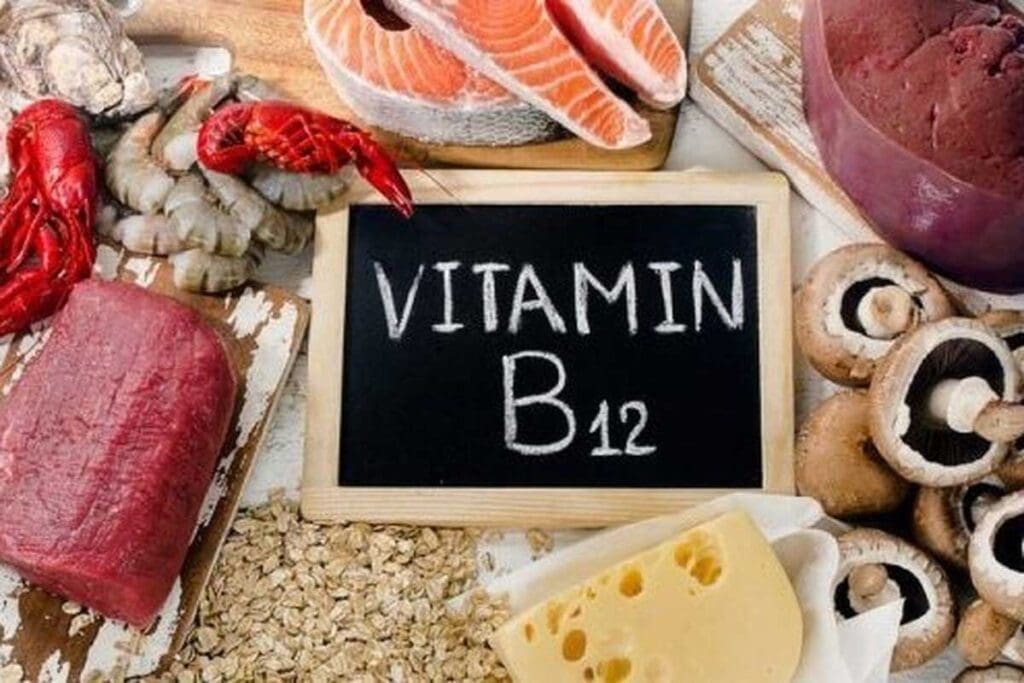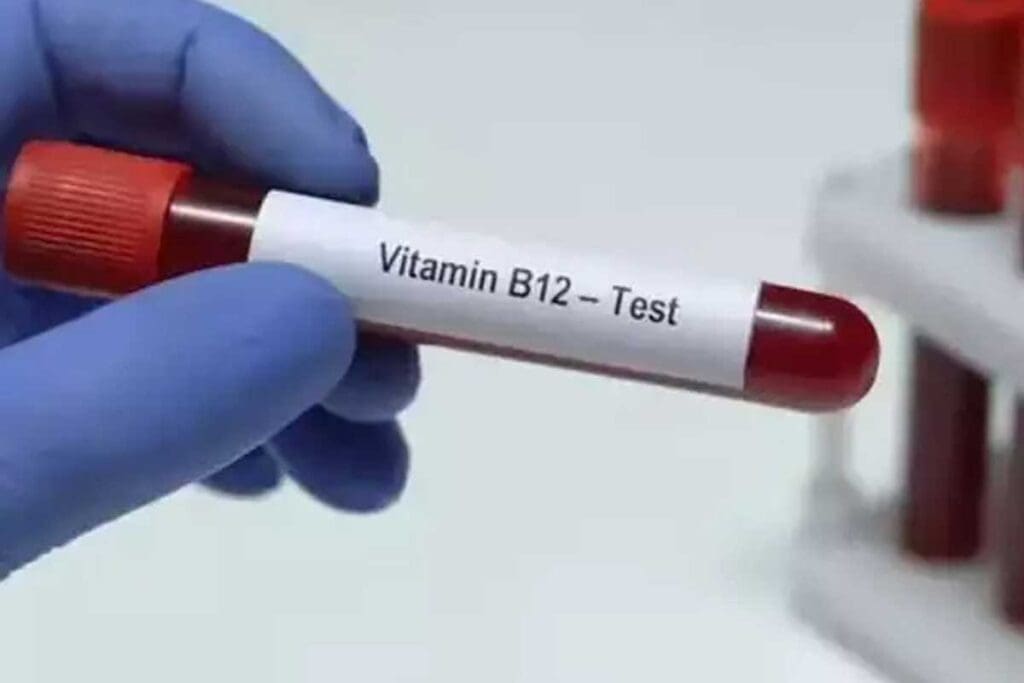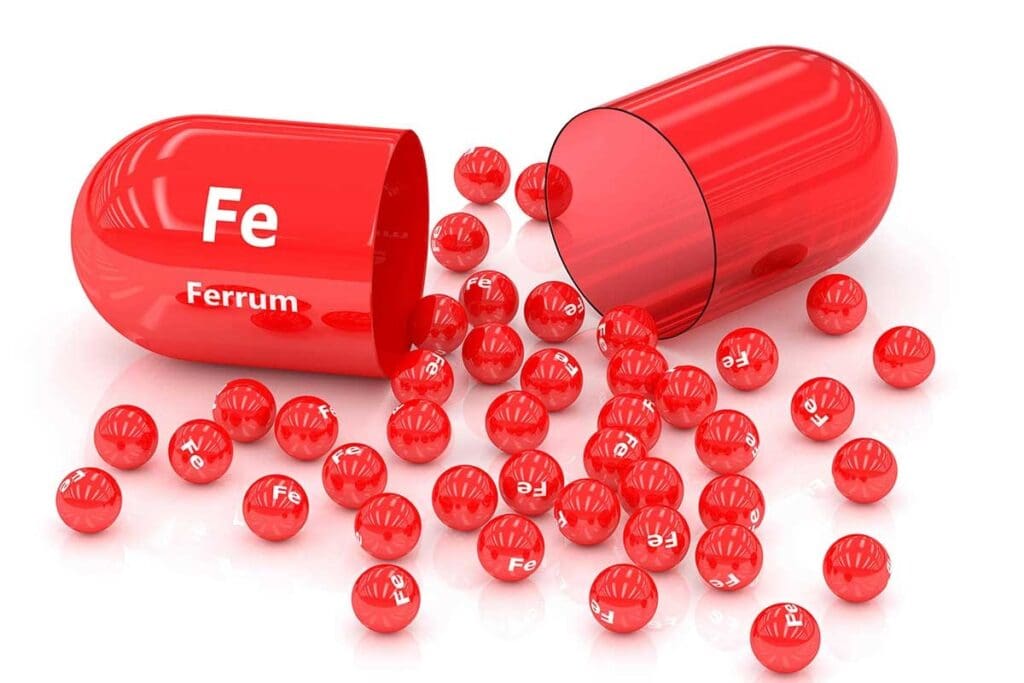Last Updated on November 17, 2025 by Ugurkan Demir

Vitamin B12, or cobalamin, is a cobalt‑containing vitamin essential for DNA synthesis, red blood cell formation, and nerve health; “another name for vitamin b12” often refers to its forms—cyanocobalamin (stable supplement form), methylcobalamin and adenosylcobalamin (active coenzymes), hydroxocobalamin (commonly injected), plus umbrella terms like cobalamin, extrinsic factor, and cobamides—each highlighting structure, stability, or clinical use.

Vitamin B12, also known as Cobalamin, is a nutrient that’s very important for our health. It has a complex chemical structure and plays key roles in our bodies.
Vitamin B12 is the most chemically complex vitamin because of its large size and a metal ion called cobalt at its core. This makes it have a unique red color and is essential for its work. Its structure is made of a corrin ring system, similar to heme but different.
At its heart is a cobalt atom, which is vital for its function. B12 comes in different forms, like methylcobalamin and adenosylcobalamin, each with its own role.
Vitamin B12 is key for many important body functions. It helps two enzymes work: methionine synthase for DNA and L-methylmalonyl-CoA mutase for fatty acid and amino acid metabolism.
It’s also important for making red blood cells and keeping the nervous system healthy. A lack of B12 can cause anemia. Plus, it helps make myelin, the fatty stuff that protects nerve fibers.

Cobalamin is the main scientific name for Vitamin B12. It’s a complex vitamin needed for many body functions. All compounds with Vitamin B12 activity are called cobalamins because they have cobalt.
The name “cobalamin” comes from the vitamin’s cobalt content. This cobalt is key to the vitamin’s function. It makes the vitamin unique.
Discovering Vitamin B12 and naming it cobalamin took a lot of research. It was first found to treat pernicious anemia. Later, studies showed its complex structure and different forms.
Doctors use “cobalamin” because it’s specific to Vitamin B12 compounds. This term is clear and helps in diagnosing and treating Vitamin B12 issues. It makes medical talks and treatments clearer.
In short, cobalamin is more than just another name for Vitamin B12. It’s the main scientific term for all its forms. Knowing about cobalamin’s origin, history, and use helps us understand its importance in health.
Cyanocobalamin is a man-made Vitamin B12 found in many foods and supplements. It’s made because it lasts longer than natural B12. We’ll look at how it’s made, its benefits, and where you can find it.
Cyanocobalamin is made through a detailed process. The production involves special bacteria that make Vitamin B12. This is part of their natural process.
Cyanocobalamin is very stable and lasts longer than other B12 types. This is why it’s often used in supplements and fortified foods. Its stability means the B12 stays effective for a long time.
Cyanocobalamin is found in many products. This includes breakfast cereals, plant-based milk, and B12 drinks (b12 bebida). It’s also in supplements with high B12 doses. These help people get enough B12, which is important for those who don’t eat meat or dairy.
In products like b12 bebida (B12 drink), cyanocobalamin is key for nutrition. It’s the most common B12 form in supplements.
Hydroxocobalamin is a key injectable form of vitamin B12. It’s used to treat deficiencies. It’s a natural form of B12, given as a prescription, usually through an intramuscular injection.
Hydroxocobalamin is mainly for treating B12 deficiency, like in pernicious anemia. It’s also for those who can’t absorb B12 orally. Injections are more effective for them.
For severe deficiencies or when B12 levels need to be quickly replenished, hydroxocobalamin injections are recommended. It’s great for those with gut issues that block B12 absorption.
Hydroxocobalamin stays in the body longer than other B12 forms. This means less frequent injections, which is a big plus for those with chronic B12 deficiency.
Its longer retention comes from binding to blood proteins. This slows down its removal from the body. So, hydroxocobalamin keeps B12 levels up for longer.
Hydroxocobalamin is also key in treating cyanide poisoning. It binds to cyanide ions, turning them into cyanocobalamin, which is then removed by the kidneys. This makes it a strong antidote for cyanide poisoning.
Cyanide poisoning treatment with hydroxocobalamin shows its wide use. It’s a vital part of emergency medicine, showing the need for different B12 forms for various medical needs.
Methylcobalamin is a special form of vitamin B12 that’s good for our brains. It helps with important brain functions. It’s also becoming more popular in top-notch supplements.
Methylcobalamin is key in methylation, a process needed for making DNA and energy. It helps convert homocysteine to methionine. This is important for DNA making and fixing.
Vitamin B12 is vital for breaking down fats and proteins. Methylcobalamin helps with these tasks. It keeps our body healthy.
Methylcobalamin is great for our nerves. It helps make myelin, which protects nerve fibers. This makes nerve signals work better.
Studies show methylcobalamin helps fix damaged nerves. It’s good for people with nerve problems.
Methylcobalamin is becoming more popular in top vitamin B12 supplements. It’s directly used by our bodies. This makes it a favorite among many.
| Form of Vitamin B12 | Neurological Benefits | Popularity in Supplements |
| Methylcobalamin | Directly supports nerve health and repair | High |
| Cyanocobalamin | Converted to active forms in the body | Moderate |
| Hydroxocobalamin | Longer retention in the body | Moderate |
More people know about methylcobalamin’s benefits. So, it’s being used more in high-quality supplements. People want products with this vitamin B12 for better nerve health and overall health.
Adenosylcobalamin is a key name for Vitamin B12. It’s important for our body’s energy production, mainly in the mitochondria.
Adenosylcobalamin is a coenzyme form of Vitamin B12, alongside methylcobalamin. It helps turn fatty acids and amino acids into energy. This happens in the mitochondria, the cell’s powerhouses. It’s essential for keeping cells healthy.
A study in a medical journal said, “Adenosylcobalamin is key for changing methylmalonyl-CoA to succinyl-CoA. This is a critical step in energy production from fatty acids and amino acids.”
“The importance of adenosylcobalamin in energy metabolism shows its big role in health and cell function.”
Adenosylcobalamin is found in animal products. Organ meats like liver and kidney are good sources. Fish, meat, poultry, eggs, and dairy also have it. For more on Vitamin B12, check out our article on cobalamin B12 biochemistry and functions.
| Food Source | Adenosylcobalamin Content |
| Liver (Beef) | High |
| Fish (Salmon) | Moderate |
| Eggs | Low to Moderate |
Adenosylcobalamin is different from other Vitamin B12 forms like methylcobalamin and cyanocobalamin. While methylcobalamin helps with methylation and brain health, adenosylcobalamin focuses on energy in mitochondria. This shows how different Vitamin B12 forms work.
In summary, adenosylcobalamin is key for energy in mitochondria. Knowing where it’s found and how it differs from other B12 forms helps us make better food and supplement choices.
Vitamin B12’s unique chemical structure is vital for its functions in the body. It is known as cobalamin and has a complex molecular structure. This structure is key to its role in our health.
The core of Vitamin B12 is a corrin ring system. It’s similar but different from the porphyrin ring in molecules like hemoglobin. The corrin ring is essential for Vitamin B12’s activity.
The corrin ring has a central cobalt atom. This is unique to Vitamin B12. It allows the vitamin to take part in special biochemical reactions.
The cobalt atom in the corrin ring is vital. It’s key for Vitamin B12’s functions, like DNA synthesis and fatty acid metabolism. The cobalt’s ability to bond is essential for Vitamin B12’s work.
The red color of Vitamin B12 comes from its cobalt. The cobalt in the corrin ring gives it its red color. This color is not just for show; it shows the vitamin’s quality and strength.
Vitamin B12 is water-soluble. This means it can dissolve in water and isn’t stored in fat. Its solubility affects how it’s absorbed and used by the body.
Being water-soluble is key for Vitamin B12’s use in supplements and food. It impacts how well the body absorbs and uses it.
Vitamin B12 comes in many forms. We’ll look at the different types of B12 supplements. This will help you choose the best one for your health.
Oral supplements are the most common way to get Vitamin B12. They come as tablets, capsules, and lozenges. These are easy to use and convenient. Tablets and capsules are simple, while lozenges are great for those who can’t swallow pills easily.
Liquid B12 supplements, like B12 bebida, are a good option for those who don’t like pills. These liquids are more easily absorbed by the body. They also come in flavors to make them taste better.
Liquid B12 has several benefits:
For those with very low Vitamin B12 levels, injectable B12 is often suggested. This method puts Vitamin B12 directly into the blood. It avoids problems with digestion.
Injectable B12 is good for:
Choosing the right Vitamin B12 supplement depends on your health needs and what you prefer. Think about how well it’s absorbed, how easy it is to use, and how comfortable it is for you.
When picking a Vitamin B12 supplement, consider these points:
| Supplement Form | Best For |
| Oral Supplements | General health and mild deficiencies. |
| Liquid Forms (B12 Bebida) | Those who prefer better absorption and have trouble with pills. |
| Injectable B12 | Severe deficiencies and urgent medical needs. |
It’s important to know the different names and forms of Vitamin B12. This knowledge helps us make smart choices about supplements and food. Vitamin B12, also known as cobalamin, has names like cyanocobalamin, hydroxocobalamin, methylcobalamin, and adenosylcobalamin. Each has its own uses and benefits.
Vitamin B12 deficiency can lead to serious health problems. Knowing the different forms of B12 helps us manage and prevent these issues. We’ve looked at the various forms of Vitamin B12, including their structures, functions, and uses in healthcare.
Understanding Vitamin B12’s names, like cobalamin or b12 names, helps us navigate the world of supplements. Whether we’re looking at cyanocobalamin for food or methylcobalamin for brain health, knowing the differences is key.
As we learn more about Vitamin B12, its importance for our health becomes clear. By staying informed about Vitamin B12’s forms and names, we can take steps to prevent deficiency and improve our well-being.
Vitamin B12 is also called cobalamin. This name comes from its cobalt content. Other names include cyanocobalamin, hydroxocobalamin, methylcobalamin, and adenosylcobalamin. These names refer to different forms of the vitamin.
Vitamin B12 has a complex structure. It has a corrin ring system with a central cobalt atom. This structure is similar to porphyrin rings but has unique features.
Vitamin B12’s red color comes from its cobalt content. The cobalt atom at the center absorbs light, giving it a red hue.
Yes, Vitamin B12 is water-soluble. This makes it easy for the body to absorb, whether in liquid or solid forms.
There are many forms of Vitamin B12 supplements. These include tablets, capsules, lozenges, and liquid forms like B12 drinks. There’s also injectable B12 for severe cases. Each form suits different needs.
Cyanocobalamin is a synthetic form of Vitamin B12. It’s used in fortified foods and basic supplements. It’s also found in some B12 drinks and nutritional products.
Methylcobalamin is a form of Vitamin B12 important for nerve health. It’s used in premium supplements for its benefits in maintaining neurological health.
Adenosylcobalamin is involved in energy production in mitochondria. It naturally occurs in food and has unique roles compared to other B12 forms.
Hydroxocobalamin is used to treat B12 deficiency and cyanide poisoning. It’s an injectable form that’s effective when oral supplements fail.
Choosing the right Vitamin B12 supplement depends on your needs and health. Consider the form of B12, other nutrients, and whether you need an oral or injectable form.
NIH Office of Dietary Supplements – Vitamin B12: Health Professional Fact Sheet
https://ods.od.nih.gov/factsheets/VitaminB12-HealthProfessional
Subscribe to our e-newsletter to stay informed about the latest innovations in the world of health and exclusive offers!